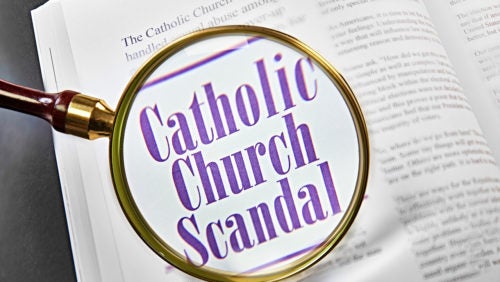Law, Lawyers and the Clergy Sexual Abuse Crisis
April 15, 2019

On April 9, Georgetown Law and Georgetown University’s Initiative on Catholic Social Thought and Public Life sponsored a dialogue with survivors, clergy, attorneys for the Catholic Church, attorneys for survivors, canon law and civil law experts, media and more.
The crisis of sexual abuse by Catholic clergy stems from many causes and failures. On April 9, Georgetown University Law Center and Georgetown University’s Initiative on Catholic Social Thought and Public Life sponsored a timely and much-needed dialogue with survivors, clergy, attorneys for the Catholic Church, attorneys for survivors, canon law and civil law experts, media, social workers and more.
A full day of confidential roundtable discussions encouraged dialogue from a range of perspectives, while a public panel discussion in the evening focused specifically on the role of lawyers. This significant initiative was organized by Lecturer Amy Uelmen, an expert in Catholic social thought at Georgetown Law; Mary Novak, associate director of Ignatian Formation at Georgetown Law; and Kim Daniels, an attorney who is associate director of Georgetown University’s Initiative on Catholic Social Thought — in collaboration with other universities and experts.
The event was supported by Georgetown Law Dean William M. Treanor and Director John Carr of the Initiative on Catholic Social Thought, himself a survivor who moderated the evening discussion.
“Events last summer reopened the floodgates of pain and anger regarding incidents of abuse…cases were too often mishandled,” Dean Treanor said at the public evening event. “The names of credibly accused priests were being released from parishes in New Jersey, where I grew up, where my kids spent their summers. I saw too many names I knew, and felt overwhelmed by frustration and sorrow. Each case, each failure to address the wrong, represents many lives that have been shattered and devastated.
“This is a place where we train future lawyers to ask difficult questions, often in the face of accusations of wrongdoing,” the dean continued. “They spend long hours mastering civil and criminal procedural protections. The study of law challenges all of us to navigate the multiple and sometimes competing values that our system embraces, both truth and justice, the dignity of the accused and the dignity of those who are harmed.”
Impact of Lawyers
Uelmen said she was humbled by the depths of what the survivors have suffered, by the expertise of those who attended and by the complexity of the cultural and legal problems involved in the crisis.
“The fact that the day happened is the real story,” she said. “We spent the day saying we need to listen to each other, listen to survivors.”
Confidential roundtable discussions in small groups — among survivors; Catholics and non-Catholics, lawyers, law students and nonlawyers, prosecutors, clergy, psychologists, social workers, theologians and more — encouraged solutions and trust.
“Much as we would like to permeate our professional lives with values of love, compassion, humility, truth, forgiveness, and pastoral care, we [are] limited by professional and procedural roles and constraints. And we struggle for good reason, because many of those constraints are in place to protect other goods: the dignity and rights of the accused, and other important policies that help to humanize our justice system as a whole,” Uelmen told attendees. “We might also bring to the discussion a clear-eyed recognition of the inevitable human fragility that can permeate factual accounts and evidence. We hope that the table discussions offer an opportunity to discuss how to work through these kinds of knots.”
“This is my church”
Professor Michael Cedrone participated in the day’s roundtable discussions and attended the evening event.
“This is an [issue] I care about — this is my church, and I felt like I had some expertise as a lawyer that I could bring to the conversation,” Cedrone said. “These cases involve complex problems for the legal system that both the state and the church are straining to resolve. It was a good chance to think about how legal systems solve complicated problems and ways to make those systems better.”
In the evening, Carr discussed the role of law and lawyers with Margaret Graf, general counsel for the Archdiocese of Los Angeles; Tom Johnson, a former prosecutor; Peter Steinfels, a former religion reporter for the New York Times; and Barbara Thorp, former director of the Office of Pastoral Support and Child Protection of the Archdiocese of Boston.
“It was a response to the enormity of the crisis,” Uelmen said afterwards. “It’s a hugely important concern, and we needed a different kind of space in which to convene. People are working on the problems in isolation, and people are feeling isolated and angry…this was very healing.”